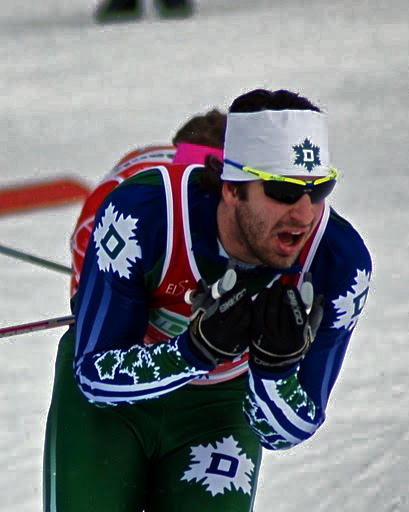Last summer, Sam Tarling of Cumberland spent more than a month living and training at the Nordic Heritage Center in Presque Isle. As a Maine Winter Sports Center athlete, Tarling lived in one of the two small dorm rooms in the basement of the ski lodge, running the trails and roller skiing over the roads of Presque Isle and Fort Fairfield.
“I was up there for pretty much the entire month of July and various weekends after that,” he said. “So I got to go on a lot of runs on the trails and get the flow of them. I think that’s going to be a big help for me.”
This week, Tarling will be skiing those trails in his fifth Junior Olympics. At 19, Tarling also will be skiing in his final Junior Olympics, which might be called the national championships for Nordic skiers between 14 and 19.
“It’s all the best juniors in the country,” said Tarling, a Dartmouth freshman who spent one year at Greely High before finishing high school at Burke Mountain Academy in Vermont. “It’s sort of the culminating race series (in which) everybody gets to prove themselves. Different regions come together and hang out and enjoy competing against each other.”
Teams from 10 regions of the United States are gathered in Presque Isle for today’s opening ceremonies. Races begin Monday with classic sprints followed Wednesday by classic mass starts, Friday by freestyle races and Saturday with freestyle relays.
Each team is allowed up to 21 boys and 21 girls across three two-year age classifications. Entering the weekend, there were 387 skiers registered.
Including Tarling, there are 10 skiers with Maine connections. Emily Attwood (Cape Elizabeth), Nick Michaud (Fort Kent) and Rachel Hall (Cumberland, attending Stratton Mountain School in Vermont) are the only high school athletes. Tarling (Dartmouth), Jake Barton (Colby), Spencer Eusden (Bowdoin), Lucas Milliken (Bates) are in college. Joey Bard (Woodland), Welly Ramsey (New Sharon) and John Dixon (Huntington, Vt.) are Maine Winter Sports Center athletes.
“Every year that I’ve been (at the event), there’s been a great crew of Maine kids,” said Tarling. “It’s always good to reconnect.”
The New England region is not only hosting this year — in Maine for the first time since Black Mountain in Rumford held the 1996 Junior Olympics — but is also the defending champ, in possession of the Alaska Cup, won last year in Truckee, Calif.
Previously, Tarling skied in Junior Olympics in Michigan’s Upper Peninsula, Soldier Hollow, Utah and Anchorage, Alaska. By virtue of a 22nd-place finish (second among U.S. skiers) at the junior world championships in Germany earlier this winter, he automatically qualified for the NCAA Division I skiing championships later this week in Steamboat Springs, Colo.
But Dartmouth is allowed to enter only three Nordic skiers, and Tarling is ranked fourth on the team.
“I’m actually happy the way it turned out,” Tarling said. “I’d rather do four races at sea level and not have to travel halfway across the country to do two races at altitude that I may not do so well at.”
The Junior Olympics are the first of four high-profile skiing events in Aroostook County this month, with the national biathlon championships scheduled for March 18-21 in Fort Kent, the national marathon championships March 24 in Fort Kent and the SuperTour series finals March 26-28 in Madawaska and Fort Kent.
“This is Aroostook County’s version of March Madness,” said Andy Shepard, president and CEO of the Maine Winter Sports Center. “I don’t think any other community in the country could pull off this many national Nordic championships in this period of time.”
Using the 2006 biathlon junior world championships, also held in Presque Isle, as a guide, Shepard pegged the economic impact of the six-day Junior Olympics at nearly $5 million, when using a multiplier of four to the estimated direct spending of $1,224,000.
The multiplier represents “how often that money gets re-spent throughout the community,” said Shepard, who worked with the Margaret Chase Smith Policy Center to come up with an appropriate formula.
Included in the direct spending is $250,000 in sponsorships, as well as food, lodging and transportation costs for visiting athletes, coaches and spectators.
“You can see, in a community the size of Presque Isle (population: 10,000), that kind of economic impact at a time when unemployment rates are what they are, and there’s as much difficulty in the economy as there is, is quite helpful,” Shepard said. “Anytime you can fill up hotels in Aroostook County for a week at a time, it’s a good thing.”
Staff Writer Glenn Jordan can be contacted at 791-6425 or at:
gjordan@pressherald.com
Copy the Story Link
Send questions/comments to the editors.




Success. Please wait for the page to reload. If the page does not reload within 5 seconds, please refresh the page.
Enter your email and password to access comments.
Hi, to comment on stories you must . This profile is in addition to your subscription and website login.
Already have a commenting profile? .
Invalid username/password.
Please check your email to confirm and complete your registration.
Only subscribers are eligible to post comments. Please subscribe or login first for digital access. Here’s why.
Use the form below to reset your password. When you've submitted your account email, we will send an email with a reset code.